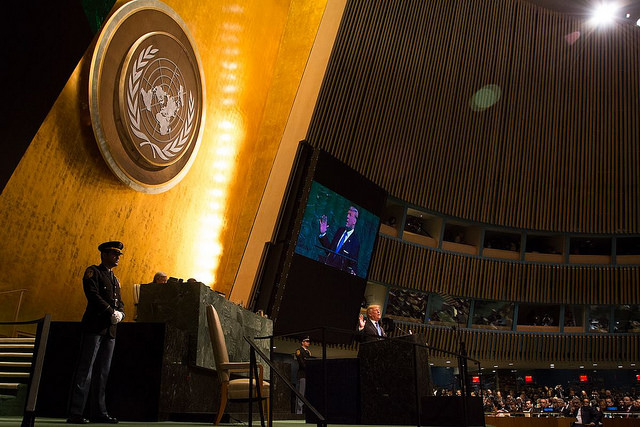This post is the first in a four part symposium on the Cuban Missile Crisis, one of the the most studied cases of IR. With the release of documents in recent decades, historical revisions have challenged the received wisdom informed by mainstream...


This post is the first in a four part symposium on the Cuban Missile Crisis, one of the the most studied cases of IR. With the release of documents in recent decades, historical revisions have challenged the received wisdom informed by mainstream...

Always attack. Even in defense, attack. The attacking arm possesses the initiative and thus commands the action. To attack makes men brave; to defend makes them timorous. Steven Pressfield, The...

This is a tragedy, but not for the reasons some think. The day after the Taliban seized Kabul, Afghanistan's capital, I received a few media inquiries. I said it's horrible that the Taliban have...

A (very small) corner of the policy world got excited Monday afternoon: the Biden Administration announced its picks for top international religious freedom positions. This is an area I've worked in...

Today's Bridging the Gap contribution comes from Theo Milonopoulos, PhD Candidate at Columbia University and alumnus of our 2017 New Era Workshop. In an often combative speech before the United Nations General Assembly last month, President Trump at times praised, and other times disparaged, an institution he once dismissed via tweet as "just a club for people to get together, talk and have a good time." Although few doubt the need for reform of an increasingly sclerotic institution, President Trump's evident disdain for the United Nations is misplaced, not least because of its ability to...
This is a guest post by Erik Goepner, a visiting research fellow at the Cato Institute. During his earlier military career, he commanded units in Afghanistan and Iraq. He is currently a doctoral candidate at George Mason University, and his main research interests include civil war, trauma, and terrorism. Post-traumatic stress disorder afflicts 11 to 20 percent of U.S. military members after they serve in Afghanistan or Iraq. The military expends significant effort to provide them with needed care. Commanders move the psychologically injured out of the combat zone. Medical and mental health...
A colleague asked me if there will be war between the US and North Korea. I said maybe, which is pretty damned scary, given the likely consequences. Why am I worried? Basically for two reasons that intersect in bad ways, besides the Trumpiness and KJU-ness factors: the US seems awfully confident that they knew where the line is between what North Korea will perceive as an exercise and what NK will perceive as the start of an attack Escalation Ladders are finite. This weekend, the US sent some bombers and fighters to fly near North Korea but not over it. How do they know the North Koreans...

Today we begin the Bridging the Gap "Book Nook," a series of short videos describing new books by scholars in the BTG network. For the first entry, our very own Brent Durbin discusses his book, The CIA and the Politics of US Intelligence Reform (Cambridge, 2017). (We hope to do a bunch of these, and we would welcome any thoughts on how to improve the format!)

This inaugural post from our partners at Bridging the Gap is written by Naazneen Barma and Brent Durbin, who will be coordinating contributions from BTG's network of scholars. Take a moment to think back to college – or whenever you decided to pursue the path that has brought you here, reading about world politics and sundry related topics on the Duck of Minerva. What set you on this path? What made you want to devote years of your life to studying politics, perhaps even through formal graduate training? If you’re like us, you looked out and saw a puzzling and imperfect world, and you wanted...
Trump's speech has something for everyone ... to criticize. I will not focus here on how icky the first part on loyalty was. Instead, I focus on the rules of US Civil-Military Relations: the US military does not like to start new wars (see Deborah Avant) once involved in a war, the US military likes to escalate. They want more troops, as if more means better. More can be better, but that really depends on the strategy and the adversary and the conditions. Washington, DC establishment prefers MORE ... something. It prefers action so one is likely to see more approving nods. Everybody...
The following is a guest post from Jennifer Spindel and Robert Ralston, Ph.D. Candidates in Political Science at the University of Minnesota. On 26 July 2017, Donald Trump announced, via Twitter, that the US Government would “not accept or allow transgender individuals to serve in any capacity in the US military.”[1] Notably, the tweets were sent exactly 69 years after President Harry Truman issued the order to integrate the US military. Even if Trump’s tweets do not lead to formal policies, they exemplify the narrative that “others” would disrupt cohesion, thus would negatively affect the...

The following is a guest post from Jeff Colgan, the Richard Holbrooke Associate Professor at Brown University. Colgan is a Bridging the Gap Policy Engagement Fellow. Follow him on Twitter at @JeffDColgan This publication was made possible (in part) by a grant from Carnegie Corporation of New York. The statements made and views expressed are solely the responsibility of the author. July 20 marks six months into the Donald J. Trump administration. Now seems like a good time to step back from the daily headlines and take stock of the situation. To what extent is the United States...